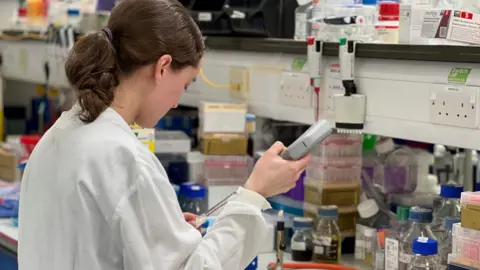How Liverpool is helping the world prepare for future pandemics
Dr Kris Subramaniam is an infection immunologist at the Pandemic Institute who studies the body's own immune response, specifically the production of T-cells which are used to fight infection.
"There's about a trillion different types of viruses, bacteria, fungi, parasites that can affect a human being," she said.
"So it really starts with identifying it. Where is it? What is it doing? How is it transmitting? How is it affecting a human being? And then we can figure out strategies of how to prevent it."
The team is currently working on a vaccine for Zika virus.
Mainly spread by mosquitos, it can cause serious birth defects and health issues and was particularly prevalent in Latin America in 2015 and 2016, most notably during the Rio Olympics.
The vaccine has just completed early clinical trials at the Royal Liverpool Hospital and Dr Subramaniam is hopeful that it will go on to the next stage.
"All of the work has been done at the University of Liverpool. So we've taken a concept all the way up to a product.
"And that's what we're hopefully going to get future funding to develop."
For everyone at the Pandemic Institute, the question is not if another pandemic will hit but when.
A growing population, international travel, increasing contact with wild animals, a warming planet – all these factors make another global outbreak more likely in the future.
"Because of the interconnectedness of our society, infections which start in one part of the world can easily affect us. Covid was a prime example of that," Dr Subramaniam said.
She added that the pandemic was also an example of what could be achieved when the world's resources were thrown at solving one issue. The first vaccine was up and running within nine months – normally that would take between 10 and 15 years to develop.
There is a feeling of optimism here that future threats are being taken more seriously than in the past. In January the government announced that the country would be carrying out a huge pandemic resilience exercise in Autumn – the largest ever.
From next month a training programme will begin for more than 4,000 people at the UK Resilience Academy, based in North Yorkshire.
That announcement was made by government minister Pat McFadden to coincide with his visit to the Pandemic Institute.

 Gill Dummigan/BBC
Gill Dummigan/BBC
But along with preparation, Professor Solomon wants to see more investment
Liverpool is now bidding for funding for a new Pandemic Preparedness and Response Facility - to be based on the site of the old Royal Liverpool Hospital. It wants to create a facility for scientists to study infections which cannot easily be safely studied elsewhere, partly by using robots.
It has already secured £1.8m in development funding but would need between £75m and £100m more to become reality.
"One thing we saw in the pandemic is that if you have a very stretched health service and a very stretched public health service there's no capacity for when things get worse," said Professor Solomon.
"That's why we need funding into health care and public health, and research to underpin them so that we have everything in place for the next threat."












